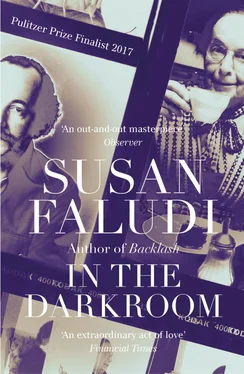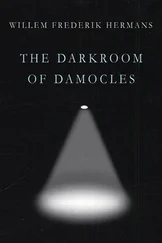Leopold bestowed a lavish dowry upon each of his four daughters. So endowed, the eldest daughter, my grandmother Rozália, or Rozi as she was usually called, merited the attentions of my grandfather Jenő Friedman, who belonged to one of the wealthiest Jewish families in the largest city of the region, Kassa (later renamed, in Slovak, Košice). Jenő’s father, Sámuel Friedman, owned Kassa’s biggest wholesale goods business. Like Leopold Grünberger, Sámuel was head of his city’s Jewish community and held the post for his affluence, not his religiousness. Unlike Leopold, he fancied himself something of a silk-stocking socialite. “My grandfather Sámuel was a man of leisure,” my father said. “I remember my grandmother saying all the time, ‘Go get your grandfather from the casino!’ He was always in there with the other rich men, playing cards and smoking cigars.”
By the time of Jenő and Rozi’s engagement, the groom was a man of leisure, too. He had begun purchasing luxury apartment buildings in Pest—with a bonanza payout from the Friedmans’ real estate investments in Hamburg. The origins of that bonanza were hardly savory, according to accounts from my few surviving Friedman relatives. My father’s cousin Viktor Schwarcz told me the Friedmans intentionally torched their company warehouse in Kassa and used the fire insurance money to buy properties in Hamburg. “The legend from the Jews in town,” Viktor said, “is that Samu and his sons burned the shop to get the money. No one told the police because they didn’t want to turn in fellow Jews. The Friedmans got rich from it—they bought whole streets of houses in Hamburg and sold them during the great inflation. And from that came your grandfather’s buildings in Budapest.”

However ill-gotten her fiancé’s gains, Rozi had landed, at twenty, the richest catch of the four sisters. She didn’t have much to do with the landing: the marriage was arranged—based on a desire of the patriarchs of both families to meld their wealth. The bride and groom barely knew each other when they were wed in an extravagant ceremony in the Grünberger home and headed off, first by horse-drawn carriage and then by first-class coach, to a fairy-tale honeymoon in Venice. They returned to a sumptuously appointed apartment in one of Jenő’s buildings in Pest, where they spent their days at cards in the casino, their nights at the opera. Their only child was raised by a succession of nursemaids, governesses, and tutors. Rozi’s one other pregnancy, my father told me, ended in miscarriage.
Once in a while when I was young, my father would allow me a glimpse into the vanished world of his childhood, a pinprick or two of light in a landscape otherwise dark. “The parents,” he would say, opening the pasteboard family album my mother had created and pointing to a creased and curling-at-the-edges tinted picture of his progenitors, the lone representative in the album of my father’s side of the family. The photo is a formal studio portrait, vintage ’20s with its soft-focus lighting and pretensions to motion-picture glamour. A halo of light wreathes the heads of two newlyweds, a vignette effect fading into shadow at the edges. Bride and groom stare toward the camera, not smiling. My grandmother Rozi has the severe dark beauty and hooded eyes of a silent-movie star. Her eyebrows are tweezed to pencil-thin crescents and she sports a Joan Crawford hairdo, cropped and set in a tight wave, dark lipstick, and a double-stranded choker of pearls with matching pearl earrings. My grandfather Jenő looks older—which he was, by nine years—and wears an expensively tailored suit; his thinning black hair is oiled and slicked back.
As for the post-wedding life of Rozi and Jenő, their bitter separation when my father was twelve, their forced wartime reconciliation, and their miserable last years in Israel, my father had little to say. But it was clear to me whom she held responsible for her parents’ troubled marriage. Rozi, my father told me, was a “spoiled diva” and a “phony” who “put on airs,” read “lowbrow” books, and was either at the hairdresser or out chasing “rich men.” “She wasn’t interested in a relationship with her child.” Jenő, on the other hand, was “very cultured,” a “true gentleman” who delivered occasional poems at dinner parties and wrote letters in “pearly handwriting,” a man who knew how to mingle in “educated circles.” Jenő was a prominent figure in the Jewish community, an observant but modern Jew who enrolled his son in the most prestigious Jewish educational institutions for boys in Budapest: the elementary school run by the Rabbinical Seminary of Hungary and then the Zsidó Gimnázium, the elite Jewish high school in Pest celebrated for its world-class teachers. “But my father was not Orthodox,” my father stressed, a statement that perplexed me; the Friedmans belonged to the Kazinczy Street Synagogue, which was Orthodox. What she meant was that Jenő didn’t look like an Orthodox Jew, whose appearance might, as she put it, “provoke.”
My father liked to parse out the same several set pieces of this early domesticity, more interior design than life experience, decorative backdrops to a privileged and assimilated bourgeois lifestyle. “My father had all his suits tailored in London.” Or: “We were the first on our street to own a car,” a Renault with leather seats, wood paneling, “a lace curtain on the back window,” and a dashboard vase that “held one rose.” Or she’d recall their “wind-up record player, spring driven,” and the first tune young Pista had played on it, “The Fox and Goose Song”:
Fox, you have stolen the goose.
Give it back to me.
If not, the hunter will get you
With his gun.
More than anything, my father talked about the family real estate: the summer villa in the Buda Hills with its swimming pool and gardening staff, the two apartment houses in posh sections of Pest, and, most of all, the “royal apartment” at Ráday utca 9. The Friedmans’ majestic domicile featured a double balcony, soaring ceilings, French doors between every room, a “salon” to receive guests, and maid’s quarters. My grandfather’s study, which contained “first-edition collectibles” in a locked bookcase, featured heavy carved-wood furnishings with red and brown upholstery in what my father called a “Napoleonic Empire style.” The salon boasted emerald-velvet love seats and chaise longues, a vitrine stocked with Rosenthal porcelain, and a writing table in a “Louis the XVI theme.” One wall displayed three near-life-sized family portraits commissioned from the then noteworthy Hungarian artist Jakab Ödön. The paintings depicted the Friedmans in aristocratic poses: my grandfather in a smoking jacket, my grandmother in a floor-length evening gown, and my ten-year-old father in velvet cutaway coat and matching knee pants. Until, that is, my father “came of age,” at which point the artist was recalled—at the insistence of the adolescent subject—to paint on a pair of long trousers. Young István was already Photoshopping. “It wasn’t manly to be in short pants,” she explained.
In the salon presided over by these imposing regal portraits, my grandparents hosted “balls,” the name my father gave to their dinner and dance evenings. Sent to bed early, Pista would lie in the dark, a crystal radio he’d built by hand pressed to one ear “to drown out the noise.” On other nights, the parents would don their finery to make the rounds of high society and attend opening nights at the theater and the Hungarian Royal Opera House. The Golden Age had been good to Jenő and Rozi Friedman.
Читать дальше













